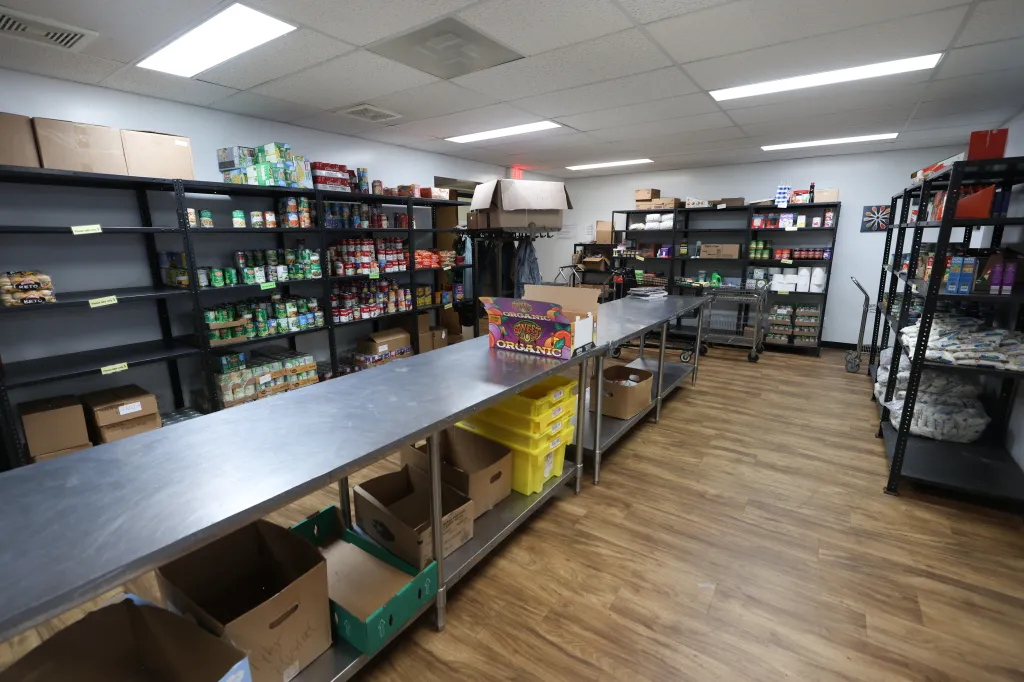Copyright Chicago Tribune

As millions of Supplemental Nutrition Assistance Program recipients have their benefits interrupted as of Saturday, and federal workers continue to miss pay as the federal government remains closed, demand at food pantries – including locally in the north suburbs – has burgeoned. “With SNAP benefits set to expire, we anticipate the need will grow significantly. We will continue to do everything in our power to share hope and bridge the gap for families who may have to find ways to put food on the table and keep a roof over their heads without the critical assistance of SNAP benefits,” Brian Duewel, spokesman for The Salvation Army North and Central Illinois Division, told Pioneer Press ahead of the SNAP pause. Duewel said that in many of the communities his organization serves, food demand in recent weeks has more than doubled from what they typically see. In fact, food pantries serving Morton Grove, Niles, Lincolnwood and Norridge had been among ones bracing in recent weeks for the anticipated increase in need as the threat of SNAP benefits loomed and the federal government shutdown continued. The Supplemental Nutrition Assistance Program provides food benefits to 41 million Americans, including 1.9 million people in Illinois, according to data from the Greater Chicago Food Depository, which provides food to pantries across the state. “While we do not know the immediate impact on our community, the longer people have limited access to resources due to the shutdown, the greater the need for our services,” Duewel said. Gov. JB Pritzker signed an executive order Oct. 30 directing $20 million to support seven food banks that supply goods to more than 2,600 food pantries statewide, according to a Pritzker administration news release. Pritzker said the state could not distribute that money directly to Illinois SNAP recipients because the Trump administration blocked states from doing so during the federal government shutdown. “We’re using whatever methods we have to feed people, and that’s to support pantries, to support organizations out there that are providing meals for people,” the governor said. In Maine Township, spokesman Robert Flinn said the food pantry has, historically, not set limits on serving people in need. He explained that the pantry, which is located in Park Ridge and offers distributions several days a week, doesn’t turn people away. That is expected to remain the practice amid the SNAP pause and the government shut down. Maine Township includes Park Ridge, Des Plaines and parts of of Morton Grove, Glenview, Niles and Rosemont. Even before the current financial challenges, Flinn said the Maine Township food pantry had seen an uptick in demand since the start of the year. In September, the pantry received 35,000 pounds of food from GCFD and served 940 households, or 1,804 people, Flinn said. Those numbers are double what the pantry served in January, he said, the result of increased demand and increased capacity. Individual donations and ones from community partners have helped Maine Township stock the pantry. Flinn said 3,223 pounds of grocery and personal care items were donated by individuals last month, while Panera restaurant donated 1,200 pounds of breads and pastries, and Jewel-Osco, Mariano’s and Aldi grocery stores collectively donated 2,800 pounds of bakery, dairy and grocery items last month. In addition to aiding the area general public, the pantry also provides weekend to-go bags of food to the nearly 4,000 students of East Maine School District 63. “We obviously anticipate an increase in demand with SNAP benefits going away but we don’t keep stats on who receives SNAP benefits,” Flinn said. “While we are setting up new partnerships … the other thing we’re trying to do is encourage pantry clients to also utilize our general assistance services to help ease their financial burden.” The township helps residents apply for emergency funds to pay utility bills, get rent assistance, senior health insurance and more. “We’re trying to take a holistic approach and do everything we can to increase our food pantry side to help folks,” Flinn said, “but there are other things we can help them with as well.” Fatima Ashfaq, director of the Rahmah Interfaith Halal Food Pantry in Niles, said she has been deluged with inquiries about her pantry’s services. “I’m getting so many calls — people are just calling, calling. We told them, ‘Take whatever we have, and we can offer,’ we don’t turn anyone away, as long as it will last,” Ashfaq told Pioneer Press. Rahmah Interfaith Halal Food Pantry opened during the COVID-19 pandemic, including another pantry in Lake Villa that was started in 2018. Ashfaq said she has received and stocked extra canned food from GCFD in anticipation of more people needing it. “We also offer ethnic food, halal food, and we also offer good rice and detergent,” she said. Ashfaq said she expects her pantries will be busy the first week of the month, serving an average of 150 people each day the pantry is open on Wednesdays and Saturdays. “People are having hard times, with jobs and prices going up and up,” she said. In Skokie, Humans at Help food pantry opened 15 months ago to serve residents of not only Skokie but Niles, Morton Grove, parts of Chicago and Evanston. “We serve whoever comes, we never turn anyone away,” said Marisol Cardenas, food pantry director. Each week, the pantry opens Thursdays and Saturdays and serves about 150 people each day, she said. Cardenas said people have been calling to find out more about the pantry. “We expect demand to increase,” Cardenas said. “People will be stressed and be at the pantry more often – people who had been on SNAP.” She said her team of volunteers is already planning to restock the pantry with more shelf-stable foods like beans, rice and pasta. She typically orders 5,000 pounds of food each week for the twice weekly distributions, but plans to increase that order with GCFD by 1,000 pounds and keep the additional canned goods in storage. “We probably need more help, as far as volunteers,” Cardenas said. “We might be ordering more food but we might need more help to unload the truck, stock and keep order when we distribute the food.



